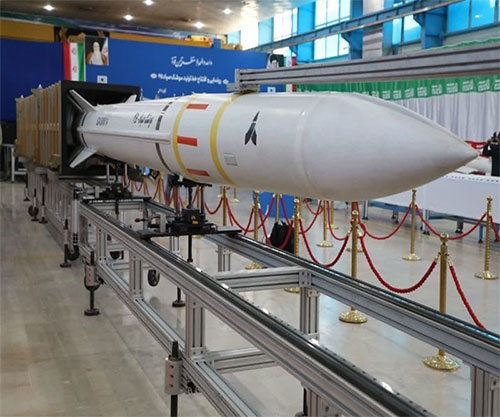In the presence of Iran’s Defense Minister Brigadier General Mohammad Reza Ashtia, a new of homegrown missile defense system, Bavar-373 with an extended engagement range of 300 kilometers, called Sayyad 4B was unveiled Sunday. The new missile’s production line was also inaugurated Sunday.
Bavar-373, as the first Iranian indigenous long-range defense system which was unveiled in August 2019, is a mobile missile defense system designed to intercept and destroy incoming hostile targets, Fars News Agency (FNA) reported.
The Bavar-373 air defense missile system is a product of creativity and reliance on internal capabilities in terms of design, development, and deployment of a strategic missile system.
According to official media, the Sayyad 4B guided missiles can be launched using vertical take-off systems , which, due to their square shape, are similar to those of the MIM-104 Patriot -Anti-aircraft missile system. The effective range of the missile should be 200 km and the service ceiling 27 km.
In relevant remarks in September, Commander of Iran's Army Air Defense Brigadier General Alireza Sabahifard said that Bavar-373 is capable of detecting and targeting the enemies' aircraft beyond the Iranian borders, as well as simultaneously detecting up to 300 targets, tracking 60 targets and engaging six targets.
Meanwhile, the Aerospace Force of Iran’s Islamic Revolution Guards Corps (IRGC) said it successfully launched Qaem 100 three-stage solid fuel suborbital carrier.
Qaem 100, the first of its kind manufactured by Iranian scientists, is capable of putting satellites weighing up to 80 kilograms into orbit 500 kilometers from the earth's surface.
The launch vehicle’s solid-fueled first-stage engine, which had been subjected to ground tests early this year, successfully completed its first suborbital spaceflight on Saturday.
According to IRGC officials, this means that Qaem 100 is now ready to launch Nahid, a satellite manufactured by Iran’s Ministry of Information and Communications Technology, into orbit in the near future.
Commander of the IRGC Aerospace Force Brigadier General Amir Ali Hajizadeh and other senior military officials supervised the flight test of the satellite carrier.
Late in June, Iran tested its domestically-developed hybrid-propellant satellite carrier rocket called Zuljanah for “predetermined research purposes” for the second time.






















